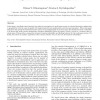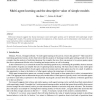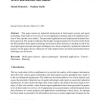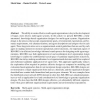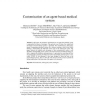85
Voted
AUTOMATICA
2008
2008
A connection between formation infeasibility and velocity alignment in kinematic multi-agent systems
15 years 2 months ago
In this paper, a feedback control strategy that achieves convergence of a multi-agent system to a desired formation configuration is proposed for both the cases of agents with sin...
107
click to vote
AI
2007
Springer
15 years 2 months ago
2007
Springer
Behavioral research suggests that human learning in some multi-agent systems can be predicted with surprisingly simple “foresight-free” models. The current note discusses the ...
AI
2007
Springer
15 years 2 months ago
2007
Springer
The area of learning in multi-agent systems is today one of the most fertile grounds for interaction between game theory and artificial intelligence. We focus on the foundational...
120
click to vote
AAMAS
2007
Springer
15 years 2 months ago
2007
Springer
Abstract. Networked multi-agent systems are comprised of many autonomous yet interdependent agents situated in a virtual social network. Two examples of such systems are supply cha...
114
click to vote
AAMAS
2008
Springer
15 years 2 months ago
2008
Springer
This paper reports on industrial deployment of multi-agent systems and agent technology. It provides an overview of several application domains and an in-depth presentation of four...
113
click to vote
AAMAS
2008
Springer
15 years 2 months ago
2008
Springer
The ability to create effective multi-agent organizations is key to the development of larger, more diverse multi-agent systems. In this article we present KB-ORG: a fully automate...
136
click to vote
CCIA
2009
Springer
15 years 3 months ago
2009
Springer
In this paper, the automatic customization of an agent-based medical system is approached by means of ontologies. The particular case of Home Care studied and developed in the EU K...
120
Voted
ATAL
2010
Springer
15 years 3 months ago
2010
Springer
This paper describes the THOMAS framework, a useful framework for the development of virtual organizations, on the basis of a service-based approach. Categories and Subject Descri...
119
click to vote
ATAL
2010
Springer
15 years 3 months ago
2010
Springer
The coordination of emergency responders and robots to undertake a number of tasks in disaster scenarios is a grand challenge for multi-agent systems. Central to this endeavour is...
115
Voted
ATAL
2010
Springer
15 years 3 months ago
2010
Springer
It is to date an open question to know how the updating methods affect the evolution of a multi-agent system. This question has been tackled for various complex systems such as ce...
